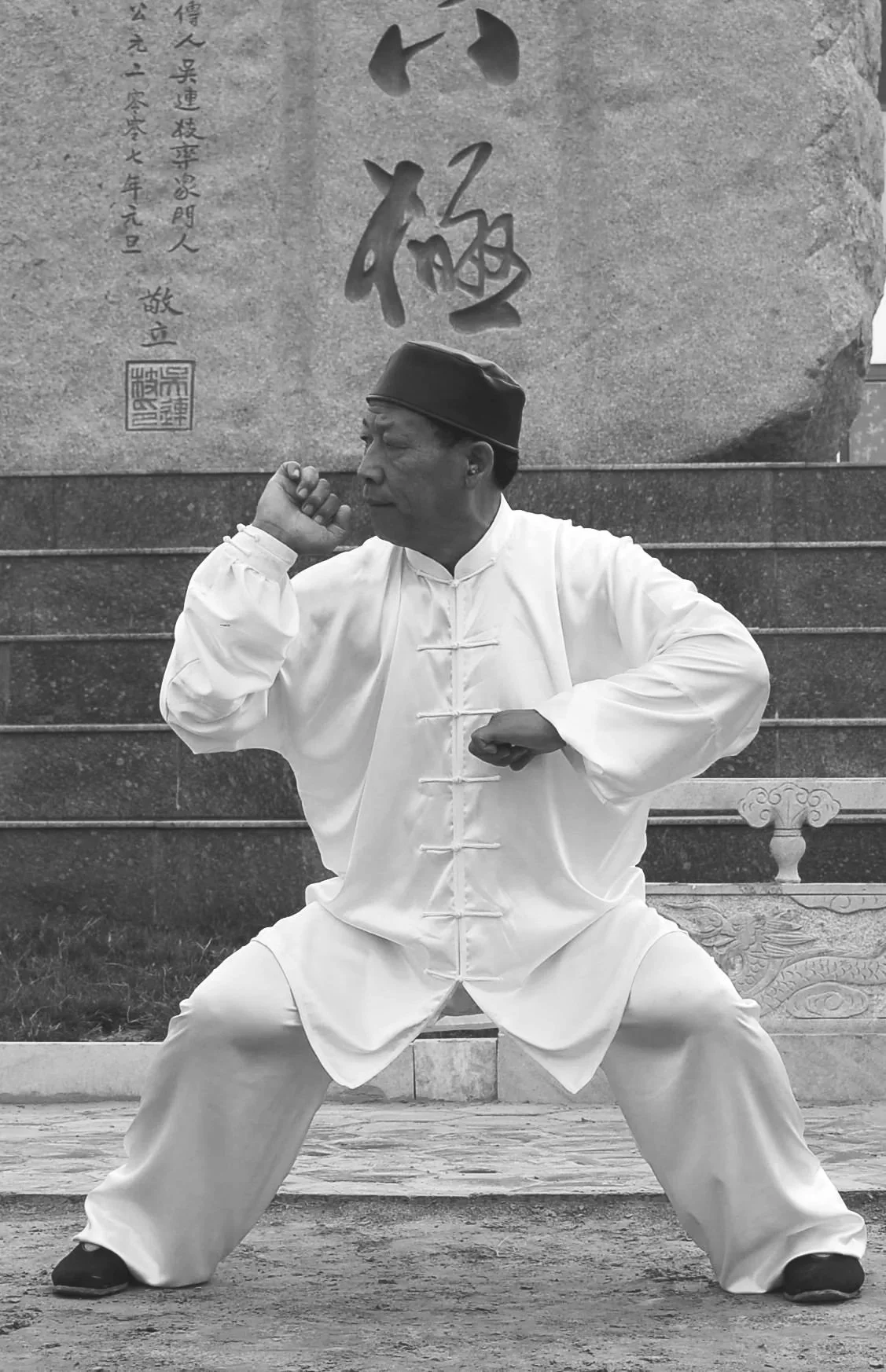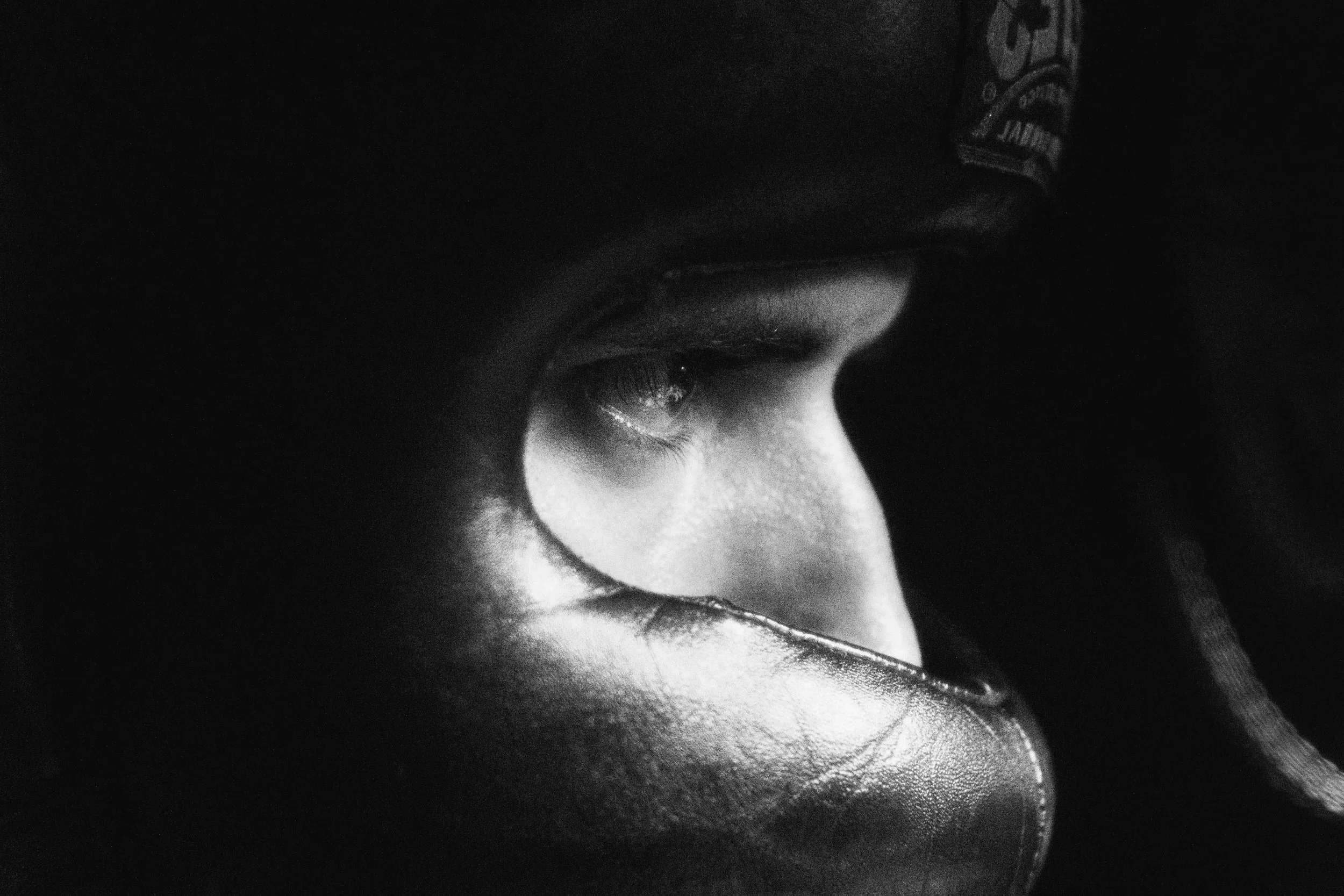
Miao Dao
The Miao Dao or (rice) grain leaf sabre…
… a twentieth century ‘pipe backed’ blade with a thin narrow edge. It is flexible for its (long!) length without being too wobbly. The current thinking is that the sword was influenced by the Japanese nodachi during the Ming Dynasty, leading to the development of the Chang Dao / Dan Dao swords, with a subsequent sprinkling of European influence (the pipe back), probably from the Prussians who were advising Chinese troops at the time, finally leading to the Miao Dao in the early 1900’s.

Grasp the Sparrow’s Tail
Peng - Ward Off, Lu - Roll Back, Ji - Press, An - Push.
The familiar moves have specific vectors of movement.
Do you know what they are?

Breakfalls
Whilst I practice the soft and gentle art of Tai Chi, sometimes more advanced training involves partner work with coordinated attack and defence moves. I have come a cropper a couple of times and found the most risky move for me is when I am throwing a (terrible!) roundhouse kick, and the defender catches it and lifts, or steps in trapping my supporting leg and pushes me over.

Bajiquan
Wutan is renowned for its baji, the ‘bodyguard style’, as this was one of the specialities of its founder, Grandmaster Liu Yun Qiao (see the lineage page). It is said that he worked as a security consultant and taught baji to Chiang Kai-shek’s presidential guard.

Kickboxing
Sanda (Chinese: 散打; pinyin: Sǎndǎ), formerly Sanshou (Chinese: 散手; pinyin: Sǎnshǒu), is the official Chinese kickboxing full-contact combat sport. In Chinese Language, "Sanda" originally referred to independent and separate training and combat techniques in contrast to "Taolu" (pre-arranged forms or routines).
Sanda is a fighting system which was originally developed by the Chinese military based upon the study and practices of traditional Chinese martial arts and modern combat fighting techniques; it combines boxing and full-contact kickboxing, which includes close range and rapid successive punches and kicks, with wrestling, takedowns, throws, sweeps, kick catches, and in some competitions, even elbow and knee strikes.

What’s in a name?
My teacher had a friend translate my name for me…
Steffan Stringer
史太玢.施臻葛
Chinese name:
施臻玢
施 - It generally means to implement, process, give, etc. It also means grace and kindness. When used as a name, it means a person with a pure heart, a heart for charity, and a loving heart.
臻 - The original meaning of "Zhen" is to achieve or perfect. When used as a name, it means perfection.
玢 - The word "玢" used in names implies beautiful jade, beauty, and transparency, and has auspicious meaning and connotation.

Fuel and Nutrients
To complement my new exercise regime (still going strong since January), I am trying to ‘eat the rainbow’, be ‘plant forward’ and hit 30 different plants, fruits, nuts, seeds etc. per day. As far as possible I try to avoid ultra-processed foods (let’s not go into how much processing it take to make many types of table olive palatable).
We get a small bag of vegetables once a week from the local community farm. I do my best to find inventive ways of using them up each week.
Our local butcher sells free range meat. I buy all our red meat there.

Students or customers?
The tradition in our Eastern modelled practice goes against our modern consumerist views on value for money and customer service. We can’t send in an anonymous ‘secret shopper’ to test the level of customer service. We don’t send ‘customer satisfaction surveys’ to students to rate their teacher. Senior instructors from my school don’t turn up unannounced and observe me teach a class. There is a big assumption that I know what I am doing!

Boxing
As a much younger person I used to spar a lot in taekwondo, using light open-handed gloves. Taekwondo sparring is basically kickboxing, and the kicks are where you get the most points. Being big and slow, I don’t think my kicks were ever that good, but I have a good reach and did OK with my hands, if I could stay out of trouble.
As we get older, we know we need to invest more time in working hard to prevent muscle and bone loss. In addition, I have been wanting to up my cardio game and work up a sweat, and to do something that I felt complemented my Traditional Chinese Martial arts. My Kung Fu teacher (I am still very much a novice here) is also a Western boxer so we often done some pad work in our Kung Fu lessons, so I felt I had some insight as to what I was letting myself in for.
Taiji Application
A series of very interesting videos by Phoenix Mountain Taichi showing possible applications for Play Pipa / Guitar, Grasp the Bird’s / Sparrow’s tail, Separating Kick, Cloud hands and counters to typical boxing strikes. This material is not endorsed by Wutan International.

Swords
This article should really be titled ‘All the Gear, But no Idea’.
In the seven or so years I have been studying Taiji I have been taught forms using some of the various weapons to be found in the Traditional Chinese Martial Arts (TCMA), including the staff, the sabre, the straight sword and the broad sword. In reality, I have only dabbled, and sadly don’t know any of the forms well enough to teach them at this time. I am hoping to change that over the next few years.
In my typical enthusiasm, I rushed out and bought all the toys, which for the most part sit in my storage cupboard, unused.
The purpose of this article is to help the curious with the the types and names of some of the swords you might encounter in TCMA.

Good food in London
What!?
Restaurant reviews now?
What’s it got to do with Martial Arts?
Will this nonsense ever end?
To be fair, the link is tenuous.
But there is a link.

The Grandmaster
Ip Man's peaceful existence is threatened by the arrival of Gong Yutian (Wang Qing Xiang), the Wudangquan martial arts grandmaster from northern China, who announces that he has already retired and appointed Ma San (Zhang Jin) as his heir in the North. He then concedes that the South should have its own heir. A fight erupts as various masters attempt to challenge Gong, but they are deterred by Ma San. As the Southern masters deliberate on a representative, Gong Yutian's daughter Gong Er (Zhang Ziyi) arrives and tries to convince her father not to continue the fight, as she feels the Southern masters are unworthy. Meanwhile, the Southern masters decide on Ip Man to represent them. Three Southern masters test Ip's skills before the confrontation with Gong Yutian.

Personal Fitness Goals
I am putting myself on notice and declaring my 2025 fitness goals (perhaps slightly late already!)
First some context - I am no longer a spring chicken having turned 60 last year. I am a big guy and am about 12 kg / 25 lbs heavier than I want to be.
I sit at my computer all day for work, don’t walk enough, and my joints no longer sustain jogging / running. I can ride a bike without discomfort, and used to do the odd longer ride (~160km) for charity, but am now out of shape.
My goal is to build cardiovascular capacity, increase endurance, increase strength, increase flexibility / joint mobility and define a regime that complements my Taiji.

It hurts when I pi
‘Pi’ is the first of the ‘five element fists’ in Xingyiquan.
It is the Splitting Fist.
It’s element is Metal.
It is represented by the Axe.
In Traditional Chinese Medicine, it is linked to the Respiratory System.

Year of the Snake
To celebrate the new year, the Chinese Association of Woking organises end of term performances at the school and in the local town centre.
This year the Wutan Kung Fu Sifus, Jim and Frank, kindly allowed the Taiji class to slide into one of their set pieces.
Taiji forms can be quite long (our short form is 5 minutes if you do it quick!) and don’t always lend themselves to a snappy demo, so we decided to do something aligned to Taiji, but different.
We settled on a very short ‘linking set’ of another ‘internal’ traditional Chinese martial art - Xingyiquan.

High Pat on Horse
We had some debate in class today about the correct shape for the extended right hand in High Pat on Horse (HPoH, Yang, Long form). I’ve been treating it as a mid-section (to the chest) push with the palm. Others see it more as a chop with the edge of the hand. In application, I guess it is what works at the time!
I’ve always been a little ‘anal’ since my long distant Taekonwdo days about knowing exactly what is the ‘weapon’ I am using, and what is the ‘target’? Those TKD guys were very specific about that, and I think it is a good thing to keep in mind. I want to get this right if I am to be passing it on to others.

What’s Fa Jin?
I was in a class today where a fellow student asked ‘What’s Fa Jin?’.
I somehow heard the question as ‘What’s Baji?’, and was ready to trot out a response based on my limited knowledge and experience. Something made me pause and challenge what I thought I had heard, ‘Oh, you mean Fa Jin? That means the delivery of power. You see that more in Chen style’. I also had a notion that it was involved with Push Hands.

Class structures, lesson plans and my ideal student
Some thoughts on what works well when teaching classes of mixed ability and whether it’s a good idea to allow ‘Pay As You Go’ (PAYG) students, rather than requiring a longer term commitment.
I discuss practical aspects of teaching that are all ‘legal, decent and honest’, but some might think of as the ’seedier’ commercial side of running any health, fitness or martial arts club and being at odds with offering the ‘higher goal’ of helping students live healthier more fulfilled lives.
These are especially important if teaching is how you make your living, rather than a hobby.
I then describe what content or curriculum makes up a good class and lastly cover my ‘ideal student’.

Traditional Chinese Martial Arts
A ‘quicky’ including good videos of Xingiquan, Karate x Wing Chun and MMA (I am sliding this last one in quietly and hoping you won’t notice that it is not Traditional Chinese Martial Arts!)
